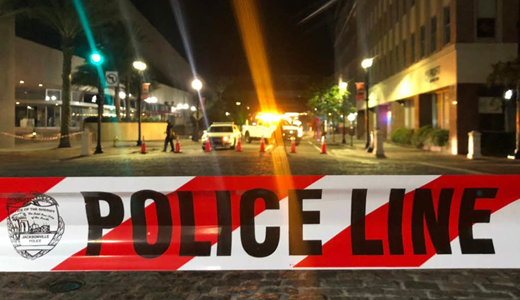Most of us turn to entertainment to get a little respite from the anxieties of the world outside. When we watch a movie, we’re not worrying about our kids’ grades. When we play a video game, we’re not thinking about deadlines. For many, entertainment is a cozy blanket we use to keep out—for a little while, at least—the chill of reality.
But sometimes, the world’s cold comes crashing in.
A gunman killed two people and wounded 11 others in Jacksonville, Florida, earlier this week, before taking his own life. The victims were all participating in a tournament predicated on Madden NFL ’19, a popular videogame. The winner would qualify to compete in a more prestigious, and lucrative, event in Las Vegas this October. The event was being streamed on the game-streaming service Twitch: Viewers watched the horror unfold live.
The gunman turned out to be 24-year-old David Katz, a competitive gamer who was registered at the Jacksonville competition. Katz had a long history of mental illness, and officials say that he was likely targeting other gamers. (The gunman’s motives are still under investigation.)
Electronic Arts cancelled other qualifying tournaments in the wake of the shooting, And USA Today addressed understandable parental concerns over esports. Is it safe for my kids to participate in, or even watch, such tourneys? “At the end of the day … esports is supposed to be about having fun, and should remain so as long as proper security measures are taken,” writes USA Today’s tech columnist Edward Baig. “With that in mind, perhaps one of the best recommendations for parents is to reassure yourself, and your offspring, by joining the kids at an esports event.”
It wasn’t the only crushing tragedy making headlines. In Colorado, a 9-year-old boy committed suicide after being bullied, according to his mother. The story has drawn attention to a number of issues, including that of preteen suicides: They’re still rare, experts say, but the numbers are growing. But, as we’ve reported before, suicide rates are growing in almost every demographic and in almost every state. Perhaps not coincidentally, a new study found that many Americans feel incredibly lonely. Millennials between the ages of 18 and 22 are especially so, and that sense of isolation doesn’t just lead to depression and anxiety, but potentially to a raft of other health problems, too.
The Church received a tragic reminder that even Christian leaders are not immune to mental health issues and suicide. Andrew Stoecklein, the 30-year-old lead pastor for California’s Inland Hills Church, took his own life late last week after “battling depression and anxiety,” according to a post on the church’s Facebook page. “And in this tragedy, we encourage anyone who is hurting emotionally to ask for help,” the post went on. “If you or anyone else is struggling, the Suicide Prevention Hotline at 800-273-TALK (8255) is a potentially life-saving resource.”
But we also were reminded that God really can help us in our darkest hours. A new study found that kids and teens whose parents are religious are less likely to die by suicide. (“We know that spiritual beliefs and practices tend to help people feel a greater sense of connection, of hope and meaning in their lives,” Melinda Moore, chairwoman of the clinical division of the American Association of Suicidology, said.) And In a Christian Post interview related to the new film Beautifully Broken, singer/actor Michael W. Smith talk about his own nervous breakdown, which brought God back into his life. “He laid down beside me on the floor in my kitchen as I wept and convulsed for three hours, from midnight to 3 in the morning,” Smith says. “I haven’t been the same since I got up off the floor.”
We’ve reported that social media doesn’t always help our sense of isolation and anxiety. Nor does it typically help education. With studies showing that many teens are punting their books in favor of more screen time, little surprise that France has decided to ban smartphones in its schools. Oh, and if you’re wondering how our progeny grew so enamored with screens … well, you might not like the answer.
But just because you dive into the world of social media, that doesn’t mean that you can’t pull yourself back out. Facebook is discovering this to its great alarm right now, as teens seem to be leaving the service in droves. And while many of those teens are merely migrating to Snapchat, Instagram and other, hipper services, some refuse to play in the world of social media altogether.
Not that such online gathering points are inherently bad. In fact, some teens are using Instagram as a sort of summer job—posting sponsored content to make a little extra cash instead of flipping burgers. And remember what I said about social media replacing books just two short paragraphs ago? The two aren’t mutually exclusive. Apparently 40,000 people have read Lewis Carroll’s Alice in Wonderland on Instagram. Curiouser and curiouser, I’d say.
Why, our technology is growing so familiar with us that it can even detect how we’re feeling. There’s a video game out there that knows when you’re scared—and it hopes to use that fear to make you even more frightened.
How nice. Just what we need.






Recent Comments